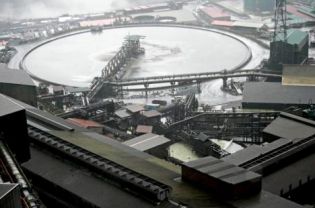 An aerial view showing the site of Freeport McMoRan’s Grasberg Mine in Papua, where workers have been engaging in industrial action to call for better wages, a move that has reportedly crippled the company’s mining operations in the past few days. (Reuters Photo/Muhammad Yamin)
An aerial view showing the site of Freeport McMoRan’s Grasberg Mine in Papua, where workers have been engaging in industrial action to call for better wages, a move that has reportedly crippled the company’s mining operations in the past few days. (Reuters Photo/Muhammad Yamin)A series of bad-weather related events and industrial action has put strain on a market that many believe will deepen into deficit this year, propping up prices of the metal on the London Metal Exchange.
“It further highlights the risk to copper supply growth this year,” said Gayle Berry, an analyst at Barclays Capital. “You have got declining output from the world’s two largest mines, plus weather-related disruptions, a slower than expected ramp-up at Esperanza [copper mine in Chile], plus now these labor issues.”
Barclays Capital sees the copper market in a 700,000 metric ton deficit this year.
Freeport’s Grasberg mine holds the world’s biggest gold reserves and is one of the largest copper producers, and the strike highlights the rising labor costs for businesses in booming emerging markets.
Workers at Codelco in Chile, the world’s largest copper producer, are set to strike for 24 hours staring on Monday to protest an overhaul of the country’s giant state mining company.
Bad weather this year has repeatedly hit the mining heartland of Chile, disrupting the operations of copper miners, and more heavy snow, wind and rain is expected in Chile’s copper-rich north.
“[These] adverse effects should probably not last for long but will be contributory factors to a much tighter global copper market over the rest of the year,” Commerzbank said on Wednesday in a note. “We therefore see good support for copper prices.”
Chilean miner Antofagasta said last month that the ramp-up of its Esperanza mine, expected to contribute the lion’s share of supply growth this year, would be completed in the second half, after taking longer than planned.
“In a different type of environment, you’d expect that to help increase price,” Berry said of the supply disruptions. “At the moment, the markets seem to be a lot more focused on macro events, but you can certainly say they are providing a floor.”
Copper prices in London fell on Wednesday, after China raised interest rates for the third time this year, but are holding within 7 percent of record highs despite continued tepid demand from top consumer China.
Gold edged lower on Wednesday, driven more by investor flows and global risk sentiment rather than supply interruptions.
Freeport’s Papua mine is already facing a 17 percent decline this year in production of copper because of worsening ore quality, with the strike likely to exacerbate the drop, said Gavin Wendt, an analyst at MineLife.
Freeport has said concentrate shipments have not been affected so far, although it has declined to comment on its operations and production.
Analysts say any force majeure, enabling Freeport to halt contract shipments to buyers, would depend on the level of stocks the US mining firm maintained at the remote mountain site.
“You may not see a force majeure unless it continues over a week,” said Carl Firman, an analyst at UK-based VM Group. “Generally, mines have built into their mine plans a certain buffer of stocks, and I’d imagine they will work those down first so they can keep shipments and contracts secure.”
Some 8,000 mine workers are taking part in the Freeport strike. Workers earning $1.50 per hour are pushing for higher wages. Their union says other Freeport workers around the world earn more than 10 times that amount.
The salary is in line with average wages last year of about $230 per month in Papua, the Central Statistics Agency (BPS) said, although rising inflation has increased living costs.
Reuters
